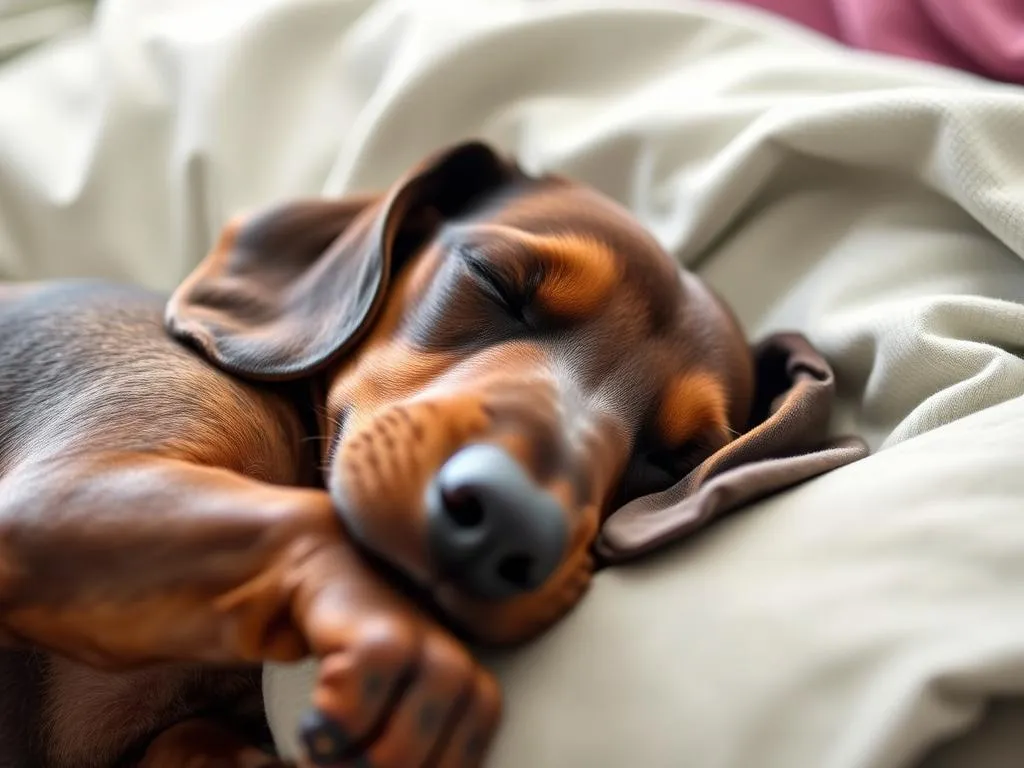
Introduction
Imagine this: you come home after a long day, excited to see your furry companion waiting for you. You’re greeted with a wagging tail and eager puppy eyes. But as soon as you settle down, your Dachshund curls up on the couch, drifting off to sleep within minutes. You might wonder—why does my Dachshund sleep so much? This scenario is all too familiar for many dog owners, particularly those who are lucky enough to share their lives with a Dachshund.
Understanding the importance of sleep in dogs is crucial for their overall health and well-being. Sleep plays a vital role in physical recovery, cognitive function, and emotional balance. In this article, we will dive into the reasons why Dachshunds may seem to snooze more than other breeds, exploring their unique characteristics, sleep needs, and what you should be aware of as a responsible pet owner.
Understanding Dachshund Characteristics
History and Origin
The Dachshund breed boasts a rich history that dates back to Germany in the early 1600s. Originally bred for hunting, these small but mighty dogs were designed to dig into burrows and flush out badgers and other small game. Their elongated bodies and short legs were perfect for navigating tight spaces, making them exceptional hunters. This history of being a working dog contributes to their unique energy levels and sleep patterns today.
Physical Traits
Dachshunds come in various sizes and coat types—smooth, long-haired, and wire-haired. Typically, they weigh between 16 to 32 pounds and stand about 8 to 9 inches tall. Their distinctive shape may influence their activity levels; the breed is not as physically robust as larger breeds, which can lead to a more sedentary lifestyle, particularly if they are not regularly exercised.
Temperament
Dachshunds are known for their curious, stubborn, and affectionate nature. They form strong bonds with their owners and can be quite playful. However, their determination can also mean they are selective about their activities. This temperament can significantly influence their overall energy levels and need for rest, prompting many to wonder why their Dachshund sleeps so much.
General Canine Sleep Needs
Sleep Patterns in Dogs
Dogs, including Dachshunds, exhibit unique sleep patterns that differ from humans. Dogs cycle through various sleep stages, including REM (Rapid Eye Movement) and deep sleep. During REM sleep, dogs may dream, often indicated by twitching or whimpering. Generally, dogs require more sleep than humans, and their sleep cycles can last anywhere from 20 minutes to several hours.
Average Sleep Duration
While the average dog sleeps between 12 to 14 hours a day, Dachshunds may sleep even more, especially if they are not engaging in regular physical activity. Understanding the average sleep duration of different breeds can provide insight into whether your Dachshund‘s sleeping habits are within a healthy range.
Factors Influencing Sleep
Several factors can influence a dog’s sleep, including age, health, and environment. For instance, puppies and senior dogs tend to require more sleep compared to adult dogs. Additionally, a dog’s environment—whether it’s noisy, overly stimulating, or calm—can impact their ability to rest effectively.
Specific Reasons Why Dachshunds Sleep So Much
Energy Levels
Dachshunds are known for having bursts of energy, particularly during playtime. However, they are not as high-energy as some larger or more active breeds. As a result, they may spend a significant portion of their day resting and recuperating from their active moments. Regular play and exercise are essential to maintaining a healthy balance between activity and sleep.
Age and Health Considerations
Age plays a significant role in a Dachshund‘s sleep needs. Puppies require more sleep for growth and development, while senior Dachshunds may sleep longer due to reduced energy levels and potential health issues. Common health problems in Dachshunds, such as intervertebral disc disease, can also affect their energy levels and sleeping habits, leading to increased sleep.
Lifestyle and Environment
The environment your Dachshund lives in can significantly impact their sleep patterns. For example, a calm home environment might promote more restful sleep, while a busy household with children and other pets might lead to increased anxiety and disrupted sleep. Socialization and mental enrichment can also impact how much energy your Dachshund expends throughout the day.
Psychological Factors
Anxiety, stress, or depression can also play a role in a Dachshund‘s sleeping patterns. Dogs thrive on routine and stability, and disruptions to their daily lives can lead to changes in behavior, including excessive sleeping. Ensuring a consistent schedule for meals, walks, and playtime can help mitigate these psychological factors.
When to Be Concerned About Your Dachshund’s Sleep
Signs of Abnormal Sleep Patterns
While it’s normal for Dachshunds to sleep a lot, it’s essential to recognize what constitutes normal versus excessive sleeping. Signs that may indicate something is amiss include lethargy, disinterest in play, or difficulty waking them up. If your Dachshund appears unusually fatigued or is sleeping more than usual, it may be time to consult with a veterinarian.
Common Health Issues Linked to Excessive Sleeping
Excessive sleeping in Dachshunds can be linked to various health concerns, including hypothyroidism, obesity, or depression. These conditions can significantly impact a dog’s overall quality of life. Therefore, it’s crucial to seek veterinary advice if you notice concerning symptoms, as early intervention can lead to better outcomes.
Tips for Promoting Healthy Sleep
Creating a Comfortable Sleep Environment
Providing your Dachshund with a comfortable sleeping environment is essential for promoting healthy sleep patterns. Designate a quiet area in your home where your dog can retreat to sleep. Comfortable bedding and maintaining an appropriate temperature in the sleeping area can significantly enhance their sleep quality.
Establishing a Routine
Establishing a consistent daily routine can help your Dachshund feel secure and promote better sleep. Regular schedules for meals, exercise, and bedtime can help your dog know when it’s time to wind down. A calm environment during bedtime, free from loud noises or disturbances, will further encourage restful sleep.
Regular Exercise and Mental Stimulation
Daily exercise is crucial for maintaining a healthy balance between activity and rest. Tailor your Dachshund‘s exercise routine to their energy levels and physical capabilities. Incorporating mental stimulation activities, such as puzzle toys or training sessions, can also help expend their energy, leading to better sleep at night.
Conclusion
In summary, there are various reasons why your Dachshund sleeps so much. Their unique characteristics, health needs, and lifestyle factors all contribute to their sleep patterns. While it is normal for Dachshunds to have longer sleep durations compared to other breeds, it’s essential to monitor their behavior and consult with a veterinarian if you notice any concerning changes. By understanding your Dachshund‘s sleep needs and providing a nurturing environment, you can help ensure they lead a happy, healthy life.
FAQs
How many hours should my Dachshund sleep?
On average, Dachshunds sleep between 12 to 16 hours a day, depending on their age, health, and activity level.
Is it normal for my Dachshund to sleep all day?
While Dachshunds do enjoy their sleep, it’s essential to ensure they have regular exercise and mental stimulation to prevent excessive lethargy.
What should I do if my Dachshund seems more tired than usual?
If your Dachshund appears unusually tired or lethargic, it’s advisable to consult with a veterinarian to rule out any underlying health issues.









